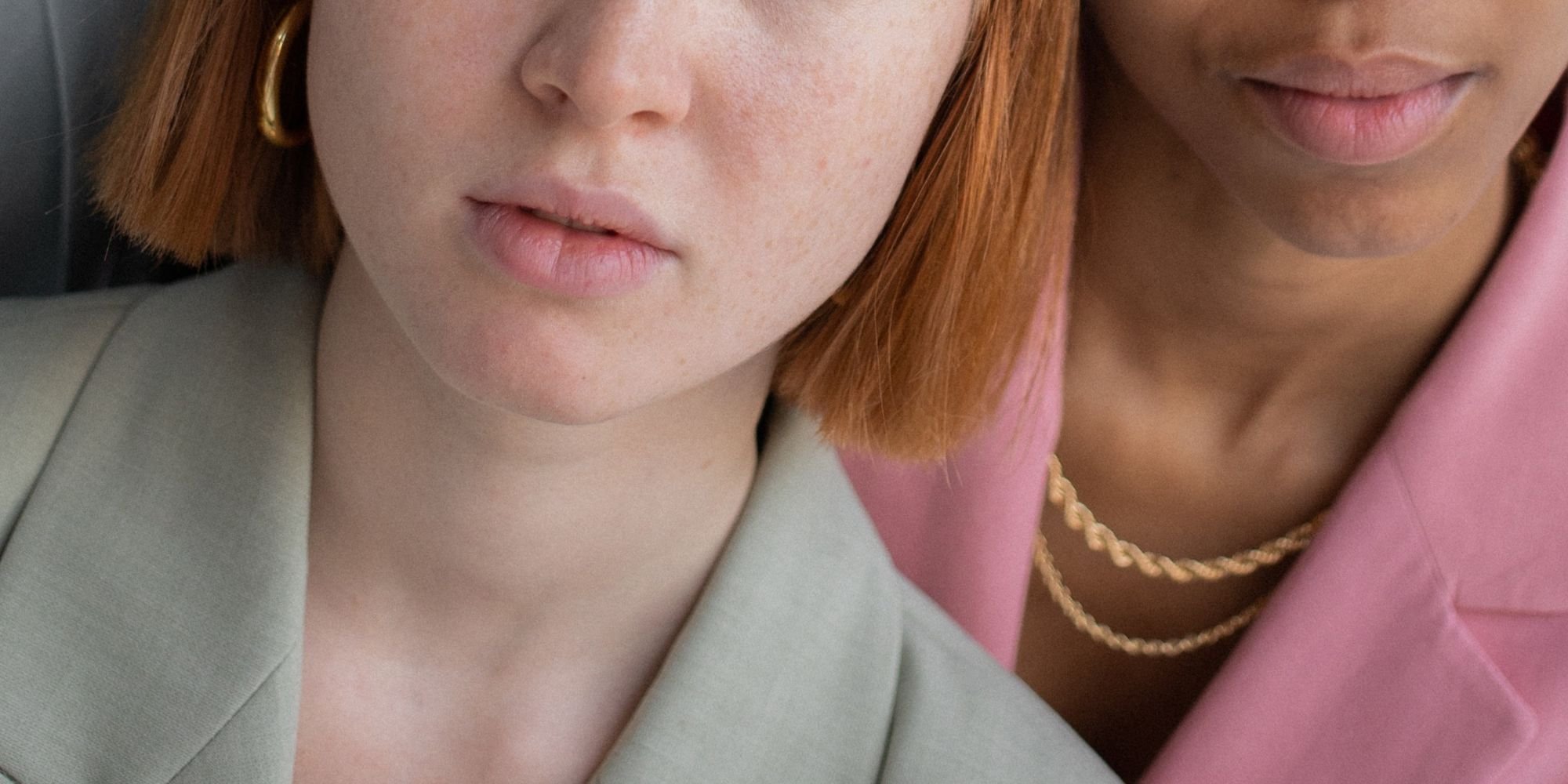Natural Solutions to PCOS Hair Growth (Hirsutism)
If you have been diagnosed with polycystic ovarian syndrome and have noticed excess hair growth, you are not alone.
In fact, almost three quarters of women with PCOS experience this stubborn symptom (1), and this was personally one of my most stubborn PCOS symptoms that took a lot of patience, long after all my other PCOS symptoms were under control.
Luckily for many women, excess hair growth - or hirsutism, as it is clinically known - can respond well to natural approaches, using dietary, lifestyle and supplemental interventions to minimise further hair growth and the appearance of facial hair.
Let’s dive into it!
CONTENTS:
Natural Solutions to PCOS Hair Growth (Hirsutism)
What is hirsutism (excessive hair growth)?
Hirsutism is where women have dark and coarse hair that grows on the face and body, most commonly in areas such as the chin, jawline, upper lip, neck and cheeks.
This excess hair growth in PCOS doesn’t always just occurs in this facial pattern, but it can occur on the chest, breasts, stomach, thighs and buttocks too.
What causes facial hair growth in PCOS?
Hirsutism is often causes by a group of hormones called androgens, which are produced in the ovaries and adrenal glands in women. This may be due to elevated levels of these hormones, or if you if you are particularly sensitive to them, and is responsible for many of the symptoms that women with PCOS will experience, such as irregular period and acne too.
The most commonly known androgen is testosterone, and this is often the hormone that your GP will assess via a blood test as part of your PCOS diagnosis.
If your hair follicles are hormone-sensitive, these androgens may cause the thin, fine hair on your face and body (also known as vellus hairs) to change into what is known as a terminal hair. It’s these terminal hairs that are longer, darker, and more coarse than vellus hair and they grow faster and thicker too.
The connection between insulin, inflammation and hirsutism
When I work with my clients we always want to go upstream to identify what is causing their symptoms, so we can add in highly personalised and targeted support.
High androgens are usually a symptom of something else going on in the body, and two key drivers we can consider are:
HYPERINSULINEMIA (HIGH INSULIN)
You may have heard of insulin resistance? This affects 70% of women with PCOS and is a condition where the body doesn't respond as it should to the effects of insulin, in turn producing more insulin and leading to higher levels of insulin in the blood.
Insulin is one of the key players for increased secretion of androgens in the ovaries for women with PCOS.
Chronic low grade inflammation
Women with PCOS have been shown to have chronic low grade inflammation, due to a number of mechanisms, but our gut health plays an important role.
This inflammation can be worsened by insulin resistance and by high androgens, leaving you in a vicious cycle.
In both of these drivers, we want to continue upstream further to identify what could be causing the insulin resistance and inflammation, which we know can be linked to our genetics, environment and dietary and lifestyle factors.
Keep on reading to learn how you can get started on your PCOS journey to improving insulin resistance and minimising inflammation.
Does everyone with PCOS grow facial hair?
It is important to remember that PCOS is a collection of symptoms which presents differently for every person, and therefore not everyone with PCOS will have excess facial hair.
In fact, it is believed that as many as 25-40 % of women with PCOS will not experience this symptom and there can be several factors involved that determine whether someone with PCOS will develop hirsutism, including how sensitive they are to androgen levels.
Although hyperandrogenism (high-androgens) is one of the three criteria for PCOS, alongside irregular periods and cystic ovaries, you don’t need all three to be diagnosed with PCOS. This means that someone can be diagnosed with PCOS without raised androgens and hirsutism, if they meet the other two criteria.
Does everyone with facial hair have PCOS?
The most common cause of hirsutism is from polycystic ovary syndrome (PCOS), but as we know not everyone with PCOS will have facial hair, the opposite can also be true - not everyone with excess facial hair will have PCOS.
For some there may be no obvious cause for hirsutism, and for others this can be caused by some medications, or other rare conditions like Cushing’s Disease.
It’s important that your doctor rules out other causes or conditions, before you receive a PCOS diagnosis.
How can I reduce my facial hair from PCOS?
For many women with PCOS who want to remove their excess facial hair, keeping on top of hair removal can be tedious, relentless and can often result in painful ingrown hairs or rashes too, which can understandably cause women with PCOS to experience low self esteem.
Fortunately, there are several ways to reduce facial hair growth in PCOS, and the most effective and long lasting approach is to address the root of the issue.
Working with a PCOS Nutritionist is a great option for those wanting to help manage PCOS and hirsutism through dietary and lifestyle changes alongside targeted supplementation.
Other options include taking medication or using permanent hair removal techniques. Both of which can be used whilst working on the underlying cause with a PCOS Nutritionist.
It’s important to note, that no matter your approach, there are no quick fixes and it can take a long time to notice an improvement in facial hair, or hirsutism, making it understandably one of the most frustrating PCOS symptoms.
Which medication is best for hirsutism?
While this blog post is aimed at natural approaches for managing hirsutism, it’s important for you to understand the different options available. If you’ve been to your GP and received a PCOS diagnosis and want help managing hirsutism, it’s likely you would have been offered one of two medications:
The Oral Contraceptive Pill
Spironolactone
Another option is using a prescription hair removal cream such as Vaniqa which works by stopping new hair growth at the follicle.
While these medications can offer relief for many women with PCOS, they can come with side effects. They ultimately may not have long lasting effects either, meaning that when you stop the medication or topical treatment, the hair may return and you will be back at square one.
If medication is an option you would like to explore, it is important to speak with your doctor about whether medication is the appropriate choice for you.
I believe you deserve more than just masking the symptoms with medication, so have shared some strategies below for you to get started with!
Which foods stop facial hair growth?
Food is an extremely important aspect of managing PCOS and hirsutism; yet it’s important to remember that there is no single food that can ‘balance your hormones’. It is best to focus on your overall diet and lifestyle to manage your PCOS symptoms.
There are some key aspects of your diet that can support your PCOS symptoms by addressing insulin resistance, inflammation and nutrient deficiencies:
Blood Sugar Balance
As we learned earlier, Insulin may be one of the main factors that contribute to increased androgen production (2), which is one of the key drivers of hirsutism in women with PCOS.
Luckily your diet can help to target this issue and balancing your blood sugar levels through your diet is key. Ensuring your meals are balanced with the correct ratio of protein, fats, fibre and a complex carbohydrate can help to stabilise blood sugar, among many other things!
Spearmint Tea
Early studies have shown that drinking two cups of spearmint tea a day could contribute to a reduction in androgen levels - and could therefore be helpful in reducing excess facial hair growth (4). Further research is needed to substantiate this, but the data looks promising. Pick up a box of spearmint tea and give it go!
Flaxseeds
There is some limited evidence to suggest that adding ground flaxseed into the diet could help to lower testosterone levels in those with PCOS (5).
Which supplements reduce facial hair?
Adding in carefully selected, targeted supplementation can be a fantastic tool in helping to reduce excess facial hair. Some supplements that may help with hirsutism include:
Zinc
There is some evidence to suggest that zinc supplementation can decrease androgens and insulin in women with PCOS (6), helping to reduce symptoms of hirsutism.
Reishi mushroom
This medicinal mushroom not only helps the body to cope with stress, but it has been shown to have anti-androgen benefits by reducing conversion of testosterone into the more potent androgen DHT (7).
Magnesium
Lower levels of magnesium are associated with higher insulin and testosterone levels in women with PCOS and these markers can be improved with supplementation (8).
Omega 3
Omega 3 fatty acids, primarily found in oily fish, could help to reduce testosterone levels (9).
Identifying which supplements you need depends on a number of factors including your medical history and any current medications you are taking. Choosing good quality supplements and getting the correct dosages are important for your safety and for the effectiveness of the supplement.
Will losing weight stop PCOS hair growth?
You might have been promised that weight loss is the cure for PCOS (I know I was!), and it can understandably be a sensitive topic in PCOS, but please take into account that weight gain is a symptom of PCOS and it is not the cause.
Not every woman with PCOS will be overweight (like with lean PCOS) and not all women will want to lose weight either, and that is your decision.
If weight loss is one of your preferences, the evidence shows that just a 5% reduction in body weight could help to improve PCOS symptoms, including hirsutism (10).
If losing weight isn’t one of your goals or if it is not suitable for you, then there are other effective ways to manage PCOS. Some of these ways have been mentioned in this blog post such as adjusting your diet and lifestyle, while taking some targeted supplements.
A personalised approach to managing PCOS
Is PCOS is taking up a lot of your headspace? If you’re fed up with carrying out your own research and spending hours reading blogs and books and scrolling on social media for the answers, then I would love to help.
I’ve walked in your shoes and have dedicated the last 7 years of my career to do the research for you - cutting through the nonsense and ensuring every recommendation is evidence based and effective, so you can get the results you deserve.
I’ve got you covered in my highly personalised and fully supportive, 12 week coaching and wellness program. With fortnightly appointments, bespoke plans and resources, and unlimited contact with me at the end of your phone. Together we will get to the root cause of your symptoms and you will leave with all the tools and knowledge to manage your PCOS for good!




